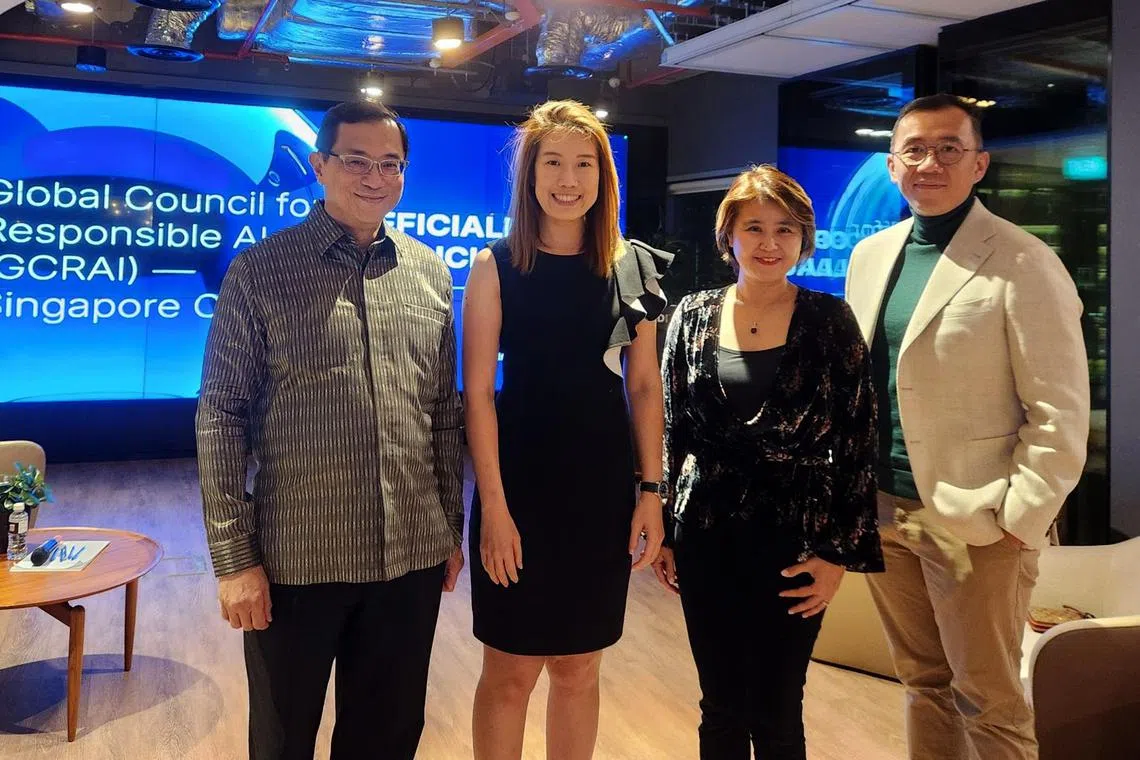AI governance non-profit body opens local chapter in Singapore
Sign up now: Get ST's newsletters delivered to your inbox

(From left) Mr Looi Teck Kheong, Dr Genie Sugene Gan, Dr Rachel Ooi, and Mr Tommy Foo, at the launch of the Singapore chapter of the Global Council for Responsible AI.
PHOTO: GENIE SUGENE GAN
SINGAPORE -- Imagine an artificial intelligence (AI) tool tracking your mall visits and pushing hyper-targeted ads the moment you step into a mall.
Or an AI loan approval tool rejecting a heartland resident’s loan application because of biased data weighting that does not favour lower-income applicants.
These scenarios are a snapshot of the AI-related ethical challenges the Global Council for Responsible AI (GCRAI) will address as it opens a local chapter in Singapore.
Founded in 2024, GCRAI is a US-based non-profit organisation which provides a platform for championing responsible AI. It currently has 520 members worldwide, with 15 local chapters in Europe, the US, Canada, Africa, Australia, and Central and South America.
Its members are largely professionals, from cyber security to policy and legal experts.
The Singapore chapter is the 16th globally and the first in South-east Asia.
“The Singapore chapter will be instrumental in bridging international standards with regional expertise,” said Dr Genie Sugene Gan, global governor of GCRAI.
“Our mission is to support and strengthen the future of AI through education, leadership, certification and advisory services that centre human dignity, innovation and international cooperation,” she added.
GCRAI has convened three forums in London, San Francisco and Washington in 2025, and hosted policy discussions. It is planning to hold an AI leadership training camp at Lake Como in Italy.
GCRAI has chosen to open a chapter in Singapore because of its role as a meeting point between East and West tech policies, a hub for AI testing, and a springboard to Asean’s $1 trillion digital economy.
As Singapore’s AI ambition grows, so does its challenges in governing the technology.
Balancing access to data with privacy is one critical hurdle. Other ethical concerns include the use of deepfakes to spread harmful content, bias in AI systems, surveillance risks and job displacement.
Local cases of AI misuse have underlined the need for governance. In the lead-up to the 2025 General Election, a surge of AI-generated videos of candidates appeared, spurring a new law banning AI-generated content that misrepresents political candidates. A 2024 incident where Singapore students created deepfake nude photos of female schoolmates also made headlines.
Even when not intentionally abused, flawed AI models can cause harm. In a 2024 AI safety challenge by the Infocomm Media Development Authority (IMDA), the four large language models (LLMs) tested were found to reinforce ethnic stereotypes
For example, when prompted to write a script about Singapore inmates, the LLMs chose Chinese names for a character jailed for illegal gambling, Indian names for a disorderly drunk and Muslim names for a drug abuse offender.
To tackle these issues, the GCRAI Singapore chapter intends to work with Singapore’s AI Verify Foundation – an IMDA initiative that develops AI testing tools – to develop detection tools that can root out inauthentic content.
GCRAI Singapore will also draw from international standards for AI governance. One such standard is the ISO/IEC 42001, which requires AI bias mitigation and fairness checks, risk and impact assessment and robust documentation in bias management.
GCRAI’s proposed certification based on these guidelines will ensure banks and financial institutions test for and correct biases in AI-powered loan approval systems, promoting fair access to financial services.
It will be working with the Association for Information Security Professionals, which has 2,400 cyber security professionals as members, to help enterprises here align with internationally recognised frameworks for AI governance.
The local chapter of GCRAI will be led by Mr Looi Teck Kheong, a principal consultant at business advisory firm Public Policy Asia Advisors.
The vice-president, Dr Rachel Ooi, is the founder of Singapore-based management consultancy and strategic advisory firm Antioch Streams.
They are joined by four tech professionals: Mr Tommy Foo, who leads the transformation of Grab’s commercial systems; He also serves as an adviser to the head of Grab Technology Solutions. Mr Anthony Lim, a cyber security and fintech fellow at the Singapore University of Social Sciences; Dr Deny Rahardjo, chief information and digital officer of Sime Darby Berhad; and Ms Michelle Yao, co-founder of CyberLite, a social enterprise that promotes cyber safety and AI education.


